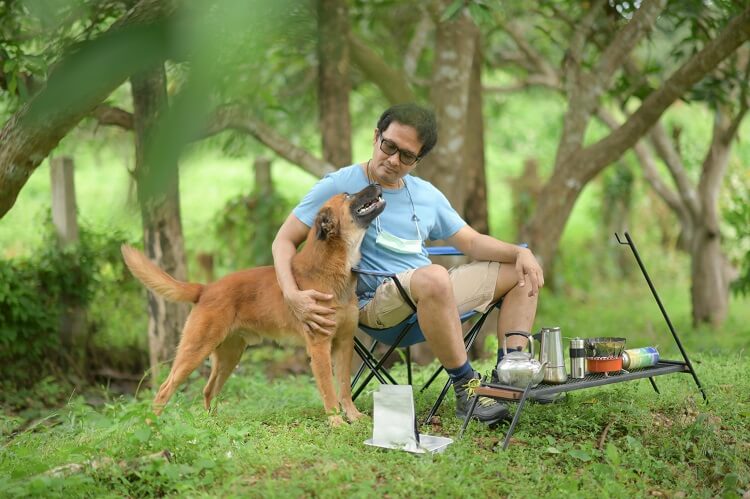

Camping at Murphys Creek Escape is an opportunity for you and your furry friend to connect with nature and enjoy the great outdoors. To ensure a peaceful and enjoyable camping experience for everyone, including your dog, it’s essential to keep your canine companion calm and well-behaved.

Tips to Help Keep Your Dog Calm and Well-behaved
Here are some tips to help keep your dog calm and well-behaved during your camping trip:
1. Pre-Trip Training:
Before the camping trip, work on basic obedience commands with your dog, such as “sit,” “stay,” and “quiet.” Practice these commands in different environments to reinforce your dog’s responsiveness.
2. Physical Exercise:
Provide your dog with plenty of physical exercise before and during the camping trip. A tired dog is more likely to be calm and well-behaved. Engage in activities like hiking, playing fetch, or swimming to help burn off excess energy.
3. Mental Stimulation:
Keep your dog mentally engaged with interactive toys, puzzle feeders, or training sessions. Mental stimulation can help prevent boredom and reduce excessive barking.
4. Comfortable Resting Area:
Set up a comfortable and familiar resting area for your dog at the campsite. Use your dog’s regular bedding and a cozy spot where they can relax and feel secure.
5. Leash and Supervision:
Keep your dog on a leash when necessary and supervise them closely. This prevents them from wandering off, encountering wildlife, or getting into situations where they might bark excessively.
6. Socialization:
Socialize your dog with other campers and their dogs in a controlled manner. A well-socialized dog is less likely to bark excessively when encountering new people and dogs.
7. Positive Reinforcement:
Reward your dog for calm behavior and quiet moments. Use treats, praise, or toys to reinforce desired behavior. Positive reinforcement helps your dog associate quietness with positive outcomes.
8. Provide Distractions:
Offer your dog appropriate distractions, such as chew toys or interactive puzzles, to keep them occupied and prevent boredom-related barking.
9. Create a Routine:
Stick to a consistent routine for feeding, exercise, and rest. Dogs thrive on routine, and having a structured schedule can help them feel more secure and reduce anxiety-related barking.
10. Address Anxiety:
If your dog tends to become anxious in new environments, consider using calming techniques such as a Thundershirt, calming supplements, or herbal remedies, after consulting with your veterinarian.
11. Quiet Command:
Teach your dog a specific “quiet” command. When your dog starts barking, use the command and reward them when they stop barking. Consistently reinforcing this command can help your dog learn to be quiet on cue.
12. Respect Quiet Hours:
Be considerate of other campers by adhering to quiet hours and minimizing any noise that might disturb others, including barking.
Remember that every dog is unique, and what works for one may not work for another. It’s important to understand your dog’s behavior and needs and adapt these tips accordingly. If your dog’s excessive barking persists despite your efforts, consider seeking guidance from a professional dog trainer or behaviorist. By following these tailored tips, you can ensure that your camping experience at Murphys Creek Escape with your dog is enjoyable and harmonious for all. Remember that every dog is unique, so adapt these strategies to suit your dog’s behavior and needs, and be patient as you both enjoy the natural beauty of this fantastic camping destination.
